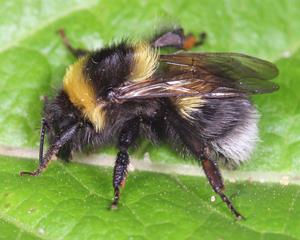Climate change 'main cause' of bumblebee decline
Release Date 10 July 2015

In the most comprehensive analysis of the impact of climate change on critical pollinators, researchers have found that rapid declines in bumblebee species across North America and Europe are strongly linked to climate change. The study was published in Science.
Professor Simon Potts, a co-author of this research and director of the University of Reading's Centre for Agri-Environmental Research (CAER), said: "This research, the most comprehensive of its kind ever assembled, shows that climate change is the main cause of range contractions of bumblebees both in Europe and North America."
Although previous smaller-scale studies on other species have shown that species expand to the North Pole as the climate warms, these new findings show that bumblebee species are not relocating. Instead, they're losing range from the south, disappearing over huge areas with the rapid warming on continental scales.
This is the first cross-continental analysis to study how a large group of pollinators responds to climate change. The study has also discovered a new biological mechanism that explains how species may respond to climate change based on their evolutionary past.
The study used long-term observations collected over a period of 110 years across Europe and North America, with a database of approximately 423,000 geo-referenced observations for 67 bumblebee species. The observations tested for latitudinal and thermal limits and movements along elevation gradients.
Professor Potts said: "This July's heatwave has caused the players at Wimbledon to sweat, but our latest study shows how the warming climate is affecting some of our most important bees and the crops they pollinate - including the tournament's traditional strawberries.
"This study shows how climate change is far more significant in the decline of bees than the use of controversial pesticides, including neonicotinoids, which are currently restricted in Europe. Other research has shown that neonicotinoids do have a significant negative impact on bees, but for bumblebees this is dwarfed by the problems caused by climate change.
"In the UK, we have seen a decline in the range of bumblebees from the south, such as the distinctive red-tailed bilberry bumblebee. Our geography as an island nation means they can only travel so far north, or move up mountains, to find more temperate conditions as the climate heats up."
Stuart Roberts, also from CAER at the University of Reading, was also involved in the study. He said: "Climate change is altering habitats quickly, but the dispersal range of most bumblebees is not great.
"Bumblebees might be able to live in climatically suitable habitats further north, but many of them just can't get there. Large swathes of land in some parts of the northern hemisphere have become so degraded and inhospitable that bees can't travel across them to find the more suitable homes that are opening up further north. Other natural barriers to movement, such as mountain ranges or seas, have the same effect.
"In addition, bees which rely on mountainous habitats are moving higher up as the lower reaches of mountains warm up to uncomfortable levels. If they can now only find the habitat they need at the very tops of mountains, they will be left stranded with nowhere else to go as the climate warms further."
The research was led by Professor Jeremy Kerr at the University of Ottawa.
(Photograph by Ian Tew.)